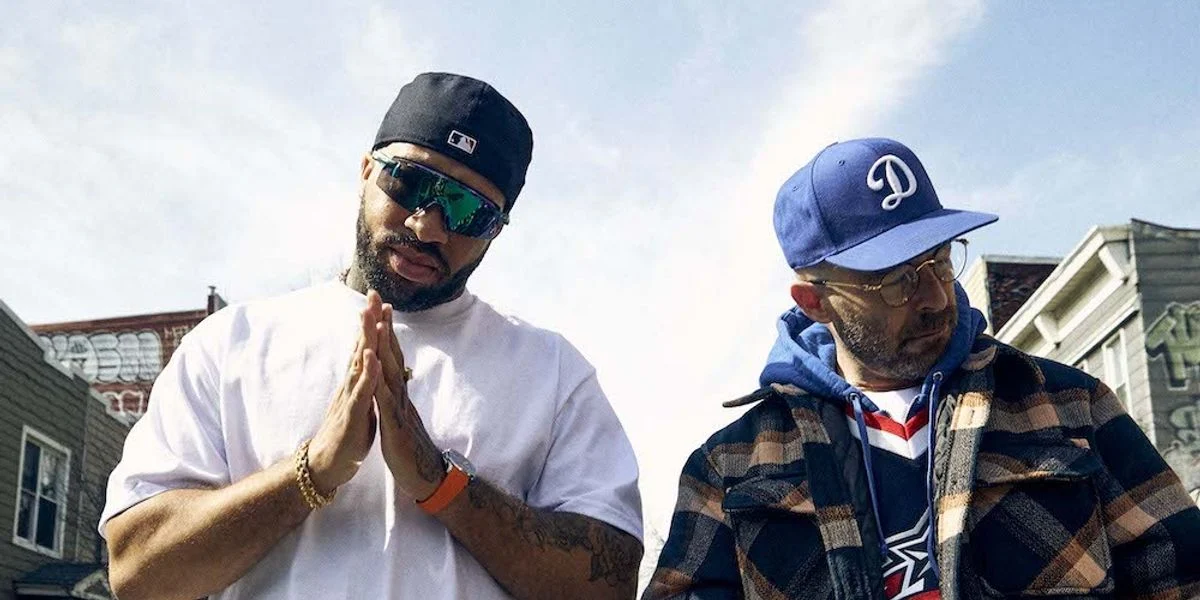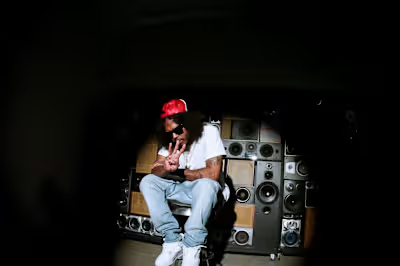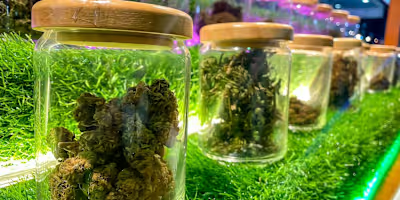The Lavish Comforts of Larry June & The Alchemist

Here's how rap titans, Larry June and The Alchemist, melded their styles into an album-of-the-year contender with The Great Escape.
It's Monday night in New York and the Lower East Side is damp with stale weed smoke and the red-eyed saturation of general inhibition normally reserved for later in the week. Not that they could have known or planned for it, but those conditions were fairly optimal for a Larry June and The Alchemist album listening party.
So good, in fact, a writer washed well-passed his rap media prime, suited up to preview their incoming project, The Great Escape (out tonight), which boasts multitudes of on-paper promise. After all, this is a pair of dominant indie rap figures crossing the creative streams for their first collaborative album. To be frank, I was genuinely curious about whether a full-length studio outing could match the strength of its first two singles, "89 Earthquake" and "60 Days." (Partial spoiler: it can and does.)
Watching bodies file into the space was a slow drip; eventually it's shoulder-to-shoulder in our corner of the recently rehabbed 140-plus-year-old former gold leaf factory, which is now capped with a skylight covering the entire floor plan. Ebbing through a dense crowd, Larry and Al gingerly make the rounds and welcome new faces as they arrive, which ranged from categorical pedestrians to high-profile fans and peers: Kelela, Curren$y, Action Bronson, Statik Selektah, Trinidad James, and Jermaine Dupri.
Around 10pm, the duo corrals the audience to the floor, where a DJ is readying a transition from the warm-up sequence to the main course. Finally, the warmly warped horns of album opener "Turkish Cotton" pour over the room, and our collective displacement commences with Larry and Al serving as the flight's leisurely co-pilots, seats cocked back and feet propped up on whatever the aerial equivalent of a dash might be. Drums are faint but felt, and the lux atmospherics are locked in right out of the gate. Veering out of the full-float opener, a shimmering piano riff and sudden lunges of strings clear the way for the brawny album anchor, "89 Earthquake." Action Bronson crashes the ring with a leap off the top buckle, cannonballing into the deep funk of "Solid Plan." The coastal California energy crystallizes on "Palisades," where a revived, mad-rapping Big Sean stakes his claim and raises a dank, murky loop to fever pitch.
On “Porsches in Spanish” and across the album’s 15 full-melt tracks, Larry June maintains an inspiring, damn-near mystical, comfort. The San Francisco rapper — who began his career splitting time between The Bay and Atlanta as a young child and early teen — has released dozens of albums over the last two decades. But he has rarely, if ever, sounded so at ease and confident.
As June told us in an interview a few days after the album preview, his resolve (at least on this project) is indebted to working with one of rap’s most hospitable producers. And Alchemist is fully aware of how verdant, effortless, and elemental their connection is. Both Larry and Al have been battered first-hand by the dark arts of the music industry. Following their several respective false starts with the majors, they've channeled those shared battles into sturdy but adaptable blueprints for how to almost entirely avoid the insidious machine as an independent artist. They describe their untethering from the label system as nothing short of a revelation. And the immutable security of complete creative and financial control radiates off every sleek syllable and carefully-cropped sound segment since they made the pivot.
Ahead of the release of The Great Escape, the indie rap titans broke down the project’s origin story, the ways fatherhood has fundamentally altered their flow, and how they melded their disparate styles into a crisp, cohesive, and guiltlessly cozy album-of-the-year contender.
Read through our chat with Larry June and The Alchemist below.
Illustrator: Louie Chin for Okayplayer
How did this project come together? What drove you towards working with each other?
Larry June: Well, I was just saying, it was our good friend Jay Worthy. We connected, did a couple records with him. I was featured on the album [Al] did with Worthy. And then, he tapped us in and we just started cooking. He wasn't fully familiar, but he heard what I did on his beats and he wanted to do some work.
Alchemist: Yeah, I been checking in, but I wasn't fully tapped all the way in. And then when Worthy put him on the joint, it was really going crazy. I had to kind of go back and listen and do my research. Like, "Yo, this dude is really dope." Sometimes you get up and you make a couple things and it's good. As a producer, you be like, "All right, I can get with this person, make some records every now and then." But some people you get with and you're like, "Damn, I can really flush out a whole project." But once we started I think I sent some beats, we started cooking, and then I heard the potential. I think we both did.
We were first thinking, like, an EP kind of thing. But then once we started, we both kind of felt like if we wanted it, this could be a really dope full-length.
Larry: I had did a couple records while I was out on tour, but we were so busy at the time. He was purchasing a new house and touring the world, and I was doing the same shit. So I think when we had some downtime we came together, and finally got back in the studio. We was talking about whole other shit for a minute. Then we got back to Cali and it was just history. I came back and recorded the "Monaco" joint from Spaceships on the Blade, which was actually for this album.
Where did you end up locking in?
Larry: Well, we locked in throughout the process. But when it was like, "Fuck it, let's do a full-length," we started looking at spots with views and went to Palm Springs. It was an energy thing.
Al: It was a full experience for me. I'm always cooped up in the lab. Some artists I work with, they like to move around and work in different environments. I feel like Larry was definitely that type. If you know his music — the sunlight, the juices and drinks, and everything affects his vibe. When he was like, "Yo, we found a crib, it's got a studio, it's up in Malibu," I said, "Hell yeah" and packed my fucking drum machine up. For me, that's fun because now I can listen to my beat in a different space.
But he's really organic. He doesn't need nothing. Hook the mic up and he knows how to record himself. People don't know that.
Larry, you've become a deceptively structured songwriter. Seems like you always find the hook, which isn't something that happens too often on an Alchemist beat. I think that's one of the strongest and most unique aspects of The Great Escape.
Larry: I appreciate it.
Al: He actually came up with the structure for "60 Days," which is why those verses are so short. I was fighting it first because I felt like, "Dang, maybe you got to rap a little longer." But he put me on, like, "No, it doesn't always have to be so 16." And he made the right call. It's way more vital.
Do a lot of rappers you work with have that sensibility?
Al: Well, your bars are everything when you rap. It's like, "Let me get my shit off," you know? But in the grand scheme of music outside of rap, when someone says, "I wrote a song," they wrote the chorus. So technically, verses are like glorified ad-libs. In the structure of music, the verse is the thing you do to keep them in, to get back to the hook. Try telling that to a rapper whose whole shit is in verses.
But I think he's got a sensibility for both. Once I started hearing the melodies I was like, "I need another one of those." Like you said, it doesn't happen a lot. So, when I get somebody who's nice — or when I was working with Freddy, who was able to do a lot of melodies — it's like, "Yeah, more." Because I work with so many rappers who just want to go 85 bars.
Larry: And his beats so smooth, man. You just want to make sure it's a vibe. "60 Days" is a loop I could've just played with nothing on there. I liked the beat so much I didn't want to rap on it.
Al: It's funny, sometimes I look at beats like beds. You know how you get a nice bed sometimes at the hotel and you jump and you sink right into it? That's how I try to make beats. I don't want there to be too much blankets and pillows on there.
Illustrator: Louie Chin for Okayplayer
Well, it takes a really hospitable producer to make so many different artists sound like they feel so damn comfortable in there.
Al: I don't know, I think that's where I probably take cues from growing up listening to Premier. Every time someone got on one of his beats it was their best performance. But I feel like that's what we're supposed to do, though. As a producer, you got to know how to play it in the back. It was like Muggs with Cypress Hill, Premier and Gang Starr, where that's part of producing, too — knowing how to cater and make Larry the star. I'm going to get my stripes for the beat but Larry is the show.
Larry: What he do is crazy, though. A lot of producers don't really got that. I definitely felt a little challenge because the beats were completely different from what I was doing. But it helped me get into a different bag and it made me more comfortable trying new things. It wasn't too many drums, so I had no choice but to go crazy and create different structures than I did on my other projects.
The Great Escape is very different from the rest of your catalog. The imagery is there but sonically, it doesn't really have the trimmings of a Bay Area album. The drums are pushed to back of the mix. There are no big synth bass lines carrying the production. Were these conscious decisions or did they happen more holistically?
Al: Well, I'll say this, the beats I was sending him got the weather. For example, the first song "Turkish Cotton," if you listen it starts kind of rainy. We always live in LA and I used to go to the Bay as a kid. Traveling up, there was foggy mornings over there when you couldn't really see the bridge and shit. I felt like I would send him beats with that fog and that rain, stuff that gave the imagery of the Bay Area in the morning. But in my mind I was making something more cinematic and not traditional.
Larry: It's the feeling, though. You're right there. But you know what? He made me comfortable in the beats. I got in there, I was like, "Man, I got to rap, rap." We listened to a Jadakiss project. All of a sudden, I'm trying to get lyrical in this motherfucker. But he was like, "No, no. Do you." So I got back to just talking my shit in a very peaceful way, and I let the features do them.
Al: Production-wise though, thinking about what you said and my relationships with old records. Obviously, I'm a fan and I knew all his shit down. But when we were making the record, I didn't really go all the way down. I'm kind of glad I didn't because I would've got wrapped up in the Fraud record, and the things he was doing with other producers. His sound is incredible but I feel like it's a good thing I didn't, because maybe I'd have been thinking of how to cater too much.
And as collaborators, you want to be the fullest version of yourselves. Like, you're not coming to Alchemist so he could be Cardo, and you're not going to Larry so he can be Boldy.
Al: Right, exactly. And that's what I was telling him. I like it because maybe we're both thinking like that. We check each other.
Larry: I was new to Al, too. Worthy put me on. I worked on one of your beats with him in 2016. But we never dropped it.
Al: I think he sent it to me. Worthy was always a big advocate. Like, "Yo, Al, you and him could make some magic." What we have now is even beyond what I could've predicted, because what we really made is a great piece of work that could sit next to anything in his catalog.
And I was thinking too, like, "Damn, he has a real fan base. And I got to make sure they're taken care of." Larry has a lot of elements but we don't have every element. When I was really digging into his bag, I went to "30 Days," which was like one of my favorite songs of his. So, I started sending him a couple beats like that and he was like, "Oh, you trying to activate trap Larry?" And I didn't know what he meant. "Oh, you got to activate another character? Like a video game? Yeah, how do we access him?"
We ended up messing with some of them, but this record felt sonically and musically like it was very lush and luxurious. Even the name, The Great Escape. It felt like a getaway. Like whatever your ideal escape would be.
How did the Slum Village collaboration come together?
Larry: That was crazy. So I'm in the lab with Al, right? I'm on YouTube and Slum Village kept coming on. I heard a song called "Call Me" and I realize they made hella songs I knew about, I just didn't put the name with the music. And that song became my theme song while making the album. I was sending him the record like, "We should do a beat this tempo." Kind of like, "I need this to be on the album."
And I reached out to them. I guess they were already familiar with my music. So we got to Detroit. I brought them out in my concert. We vibed and shit. And from there, we just started making music.
Illustrator: Louie Chin for Okayplayer
I also noticed Uncle Herm is suspiciously absent from the project.
Larry: We got him on there, we just didn't use it yet. We'll probably use it for the deluxe, unless Al wants to toss him on there.
Al: Hey, who knows? We got a little time.
Larry, can you tell me a bit about Big June?
Larry: Big June? That's my dad. When it came to picking cars, the way I be dressing now, he was a big inspiration for me, style-wise. He was in the music industry, too. Had a record label back in the day called World Records. It was a hood thing. Didn't really go mainstream with it.
He was always around me on studio sessions and teaching me how they were moving in the hood. He was just a big inspiration to everything I'm doing — from the 5.0, the same one I've got, that's the one he had when I was a kid. I built it just like that, built it the same way.
Same with the RBL Posse. I grew up around them people and just that whole vibe and energy. You look at them back then and see me now and be like, "Oh, that's pretty neat."
You can see the through line.
Larry: That style is my inspiration, you know what I mean? San Francisco legends, man. It's not really a lot of light on San Francisco, so people don't know that. They just be thinking it's an LA thing or something like that, but really it's a whole different world. We was riding the 50s and all of that, and I got to see it hands-on and really be in the same neighborhood. RBL Posse was crazy back in the day. They had a street gang called the Ninjas, who used to hop out the trees and shit and rob niggas. They'd be hopping out of anywhere, just coming through getting shit.
That's like a fucking cartoon.
Larry: You had to just be there. It was crazy. It was a whole different energy. But yeah, my pops was a big inspiration behind what I'm doing. I keep him around.
Was he the first one that showed you that rapping was a viable option?
Larry: Yeah, but he didn't give me that motivation to be a rapper. He wasn't super big on rap. He was just like that dude who was doing compilation albums with everybody. I kind of got hooked on being a rapper when I moved to ATL with my mom. You know Baby DC? He was the first artist Too $hort signed. He had a studio in the basement and an MPC. He was the first person I ever seen with that. But I wasn't really rapping yet. I was in love with the MPC and I just wanted to do beats. I kind of started rapping on a Yamaha keyboard with five tracks, but I was really just fucking around.
The rap shit really became serious for me when guys came and set that Pro Tools up for me. I was probably 12 or 13? They taught me how to use all that shit, and I just fell in love with recording myself. It was never like a lyricist thing for me. I was really fascinated with ad-libs back then. I liked Jeezy and how he placed his ad-libs. When Pro Tools came, it made it way easier for me to make and structure a song. I treated it like making beats but I was never really into the super hip-hop feel, like all the old-school shit. I didn't even know about it like that, because I was in the Bay and I just wasn't around it. But he put me on to shit every day.
Al: Yeah, I just put him onto things I think he should know, if he didn't.
What's the most recent revelation?
Larry: He showed me DJ Premier and Mobb Deep.
Al: He really just genuinely didn't know. The funny thing is, his taste is so good that anything we grew up loving, 9 out of 10, if I show it to him, he loves it, too. When people see the tracklist I think they'll automatically assume it was me that made some of the plays. But it was him.
And there were a couple artists I had never worked with until this record, like Ty and Big Sean. These are artists I had been meaning to get with and I think Larry sealed the deal.
Al, what's something Larry put you on to?
Al: You know, shit like Barragan Lighting. Larry, he lives more than me. I don't live like he do. He appreciates some of the flyest shit in the world. So, you could listen to his shit and get hip to a lot of things. He paid $500 for a salt shaker and I didn't know you could do that.
You both do a remarkable job of navigating the industry as independent artists, but you have very different approaches. Why is the indie path so important?
Al: I mean, you control your shit.
Larry: Yeah, and it's cool that you can be genuine. But it's ups and downs in this shit. You'll be discouraged sometimes, but then you can navigate through that and really go through the motions and be like, "I'm still going to be me. I'm still going to drink this orange juice and say 'Yee Yee.' Watch me go buy this motherfucking house off the 'Yee Yee.'"
You got to really stand on everything you doing and keep on pushing it. I did a deal with Warner Bros. in 2016. I did two EPs with them. But I'm a hustler. I saw I could be on the radio, do all this shit, with nothing, no help.
Al, you've got some experience with that, too.
Al: I mean, I care about the shit from A to Z, and I know what he went through and a lot of other guys that we know went through. When you go through the industry, you keep trying to explain your vision and ideas to a company and a bunch of people who then try to translate your ideas. And you get frustrated because maybe it's better or it's worse, but it's not exactly what you envision.
I'm also a control freak because I care about all the details. So for me, it became so much more fulfilling that it's not even an option on that side of things. Then, you get to the business side. Are you kidding me? It's like a door that they're not going to tell you to bust through. But trust, there's a learning curve. You're going to fuck up a lot. Every drop that I do, I double back on my guy. "What did we do wrong? All right, let's fix that for next time." We update our strategies every time. Because the brand is an extension of the person. And listen, I don't preach it for everybody. Everybody has a different lane. But I think it's worked amazingly for him, and I feel like I cracked the code when I started doing that shit.
To cap this off, I wanted to dive a bit into your respective reflections on parenting. Larry, you've been a dad for a while now and Al, you've just had your second kid. How are you guys managing the balancing act of fatherhood?
Larry: Well, for me, my son will be coming with me on tour for a while.
Oh, so you're getting him into the system.
Yeah, he came with me on a couple tours already. I potty trained my son on tour. He got used to it. He used to not understand what I did. So, I took him with me and showed him how I was selling merchandise and orange juice, all that shit.
You got to be present to it and you got to be on schedule. When I leave here I'm going straight to him, and I have him do some courses. My grandmother help me with that and I have my mom and dad there with me. You got to have a good head to have balance.
Illustrator: Louie Chin for Okayplayer
What about you, Al? Your sons are really young.
It's tricky, man. I love my job and I live in the studio. Part of the perk of this job, which may sound ridiculous to some, is I used to see people commute to work and how fucking depressed and upset they were. And I used to think, "If I could have a job where I don't have to get stuck in traffic, how much stress I might've saved my life just not having to drive back and forth to work."
Because I always kept a studio in my crib and up until I had my son, I lived in a studio. Like, I had a studio and I would live connected to it. So really, the hardest part for me is going home now at night. I go home now and I tell people that, and they're like, "Yeah, great fucking job." But if you know me that's a big step.
This is changing my flow. Evidence was like, "Oh, you have a kid now. You're going to get down here with us." And like with me, he said, "You have an advantage because you stayed in your bag. You never got out of the fucking bag." I would make a fucking beat at night at two in the morning, fall asleep, wake up at six and get back to it. That was my thing. And now I have to go home. If people are in the studio and we're working — obviously people that are my friends like Earl and them — and it gets time that I got to dip, I won't even say shit. I'll just fucking leave and come back at 6am. Won't even shut the session down. I got to keep the flow going.
Basically, I'm learning how to adjust. I want to be there. Having my kids, it gave me a different grind that I didn't even realize. Like, shit just been going up more. It's funny how you start busting in a different mode when you have kids. I didn't even do it consciously. Like he said, that shit got him right.
You bring the kids in the studio and let him bang around the pads a little bit?
Al: He's already taken to it himself. It's scary, but it's just natural and fun. And you know I'm recording everything.
__
Like this project






